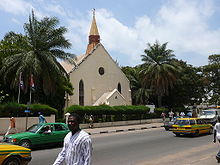|
Religion in the Gambia
  The Gambia is a Muslim majority country, with Muslims constituting 96.4% of the population, some 3.5% are Christian, and 0.1% practice other religions (including African Traditional Religions).[2] Legal regulationsArticles 17, 25, 32, 33, and 212 of the Constitution guarantee and protects the freedom of religion.[3] Article 60 of the constitution prohibits forming political parties that are formed on a religious basis.[3] Government meetings and events typically commence with two prayers, one Islamic and one Christian. The government often invites senior officials of both religious groups to open major government events with prayers. The government does not require religious groups to register. Faith-based nongovernmental organizations (NGOs) must meet the same registration and licensing requirements as other NGOs.[4] Freedom of religionIn 2023 the country was scored 2 out of 4 for religious freedom; it was noted that non-Sunni Muslim groups experience discrimination.[5] IslamAccording to the CIA World Factbook, Muslims constitute 96.4 percent of the population.[2] The vast majority are Sunnis influenced by Sufism. The main Sufi orders represented are Tijaniyah and Qadiriyah.[6] Sufi orders pray together at common mosques.[7] A small percentage of Muslims, predominantly immigrants from South Asia, do not ascribe to any traditional Islamic school of thought.[7] Islam and stateThe Supreme Islamic Council is an independent body that advises the government on religious issues. Although not represented on the council, the government provides the council with substantial funding. The country's president serves as the minister of religious affairs and maintains a formal relationship with the council.[8] The constitution establishes Qadi courts, with Muslim judges trained in the Islamic legal tradition, in specific areas that the chief justice determines. The Qadi courts are located in each of the country's seven regions and apply sharia law. Their jurisdiction applies only to marriage, divorce, custody over children, and inheritance questions for Muslims.[9] Non-Qadi district tribunals, which deal with issues under the customary and traditional law, apply sharia, if relevant when presiding over cases involving Muslims. A five-member Qadi panel has purview over appeals regarding decisions of the Qadi courts and non-Qadi district tribunals relating to sharia.[10] AhmadiyyaAmong the immigrants from South Asia there are also followers of the Ahmadiyya faith.[11] In 2022, there was an estimated 50,000 Ahmadiyyas in the country.[12] ChristianityA significant minority, estimated 3.5% of the population, is Christian.[2] The Christian community, situated mostly in the west and south of the country, is predominantly Roman Catholic. In 2007 there were also several Protestant groups including Anglicans, Methodists, Baptists, Seventh-day Adventists, and various small evangelical denominations.[7] HinduismIn 2022 there was a small group of Hindus among the South Asian community.[13] According to ARDA, Gambia had 0.02% Hindus in 2020.[14] Regulation of interfaith marriageIntermarriage between Muslims and Christians is common.[15] Traditional religions and syncretism
Less than 1% practice traditional African religion.[16] In some areas, Islam and Christianity are syncretized with traditional African religion, such as the Serer religion.[17][18] Other beliefsThere is a small number of followers of the Eckankar and Baháʼí Faiths in the country.[19] Religion and ethnicity
Faith practices outside codified IslamFemale genital mutilationFemale genital mutilation (FGM) is a practice that is prevalent in many African countries and has sparked various debates around religion and tradition/culture. FGM as a rite of passage is practiced heavily in the Gambia; about [21] 75% of the population indulges in it, mainly affecting young girls before they reach 18. It is the ritual cutting or removal of some or all of the external female genitalia. This is a pre-Islamic practice, but many use the Qu'ran to justify it, stating that Allah has vindicated it. Nevertheless,[22] out of the eight ethnic groups, seven engage in the practice. It is a practice that is believed to ensure premarital virginity and marital fidelity. The World Health Organization (WHO) has recognized it as a violation of the human rights of young girls and women. In 2015 former [23] President Jammeh banned FGM, ordering anyone who was caught performing would be sentenced to jail; however, there is no law stating that it has been officially banned. AnimismAlthough Islam is a monotheistic religion, many ethnic tribes in the Gambia are practitioners of animism and have faith in other gods. The practice of wearing Jujus around the waist is a common feature among ethnic groups. Jujus are charms that are believed to have magical or supernatural powers. Many wear them as protection or good luck charms against any evil. Gambian wrestlers, soccer players, artists, and people in various professions are known for wearing Juju waistbands. The Juju waistbands are mostly Qur'anic inscriptions prescribed by Marabouts enclosed in leather pouches; in the Mandinka language, they are called Safou. Marabouts can be Islamic teachers, fortune tellers, shamans, or spiritual guides. People seek advice from them to obtain any form of good fortune and luck. The local herbalists/marabout make these Juju waistbands to protect people from evil and improve their status. Praying at sacred sitesMany Gambians will pray at sacred sites where holy men frequently pray to seek Allah's blessing. Places such as crocodile pools, ancient trees, and burial sites are familiar places where Gambia Muslims seek prayer answers despite it being against the Islamic Code. The most common sacred sites are in Bakau Kachikally (the Kachikally Museum and Crocodile Pool), and Kartong Folonko. People frequently visit these sites for various reasons, such as seeking blessing for a promotion at work and praying for their children. Women who cannot have children often visit these sites to seek Allah's blessing in the hopes they will conceive. Death-related superstitions (late-night calls)Late-night calls are the calling of someone's name at night. Many communities believe that calling a person's name at night comes from owls announcing the community's pending death. Owls in many ethnic tribes are seen as evil; thus, tribe elders advise members never to answer late-night calls. See also
References
|

